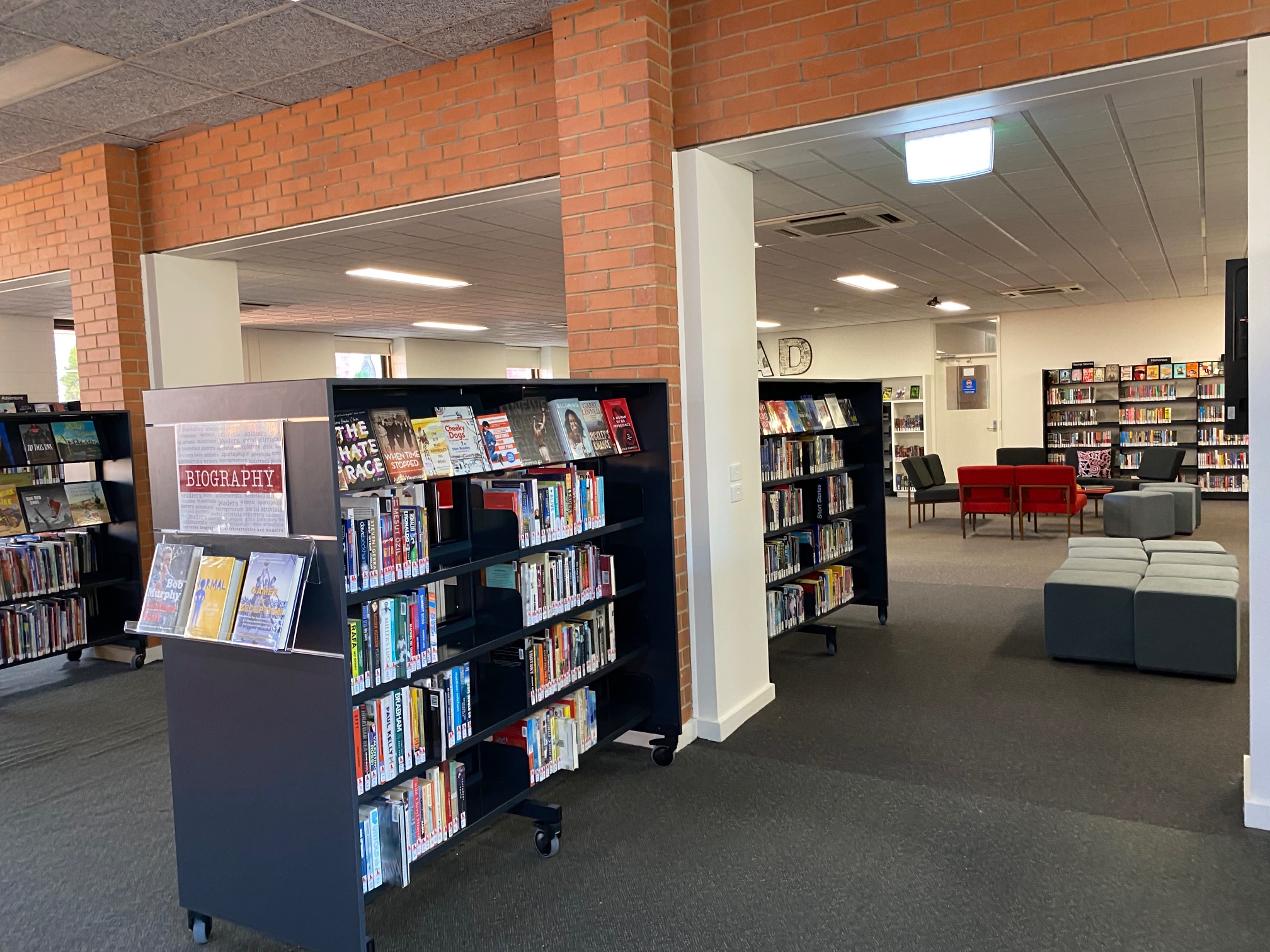Issue 114
Term 3 2020
School library spotlight: St Joseph’s College, Geelong
SCIS speaks to Joy Whiteside, teacher librarian and Library Manager at St Joseph’s College, Geelong, about what is happening in her school library.
The library’s role in the school community is to be connected, multifaceted, flexible and relevant … the library has to be everything to everyone in the school community.
What is your job title, and what does your role entail?
I am the Library Manager at St Joseph’s College (SJC), Geelong, a Catholic secondary school for 1,870 boys in years 7–12. I am a teacher librarian as well as the Library Manager, and I lead a team of three library technicians and a library assistant. I contribute to the wider profession through School Library Association of Victoria (SLAV) committees, and share my knowledge through presentations, mentoring, and writing for journals. My role at SJC is to lead the library team to support the educational objectives of the school through the development, facilitation and promotion of excellent print and digital resources, and the provision of library services.

What is the most rewarding aspect of working in a school library, and why?
A rewarding aspect of working in a school library is being able to ‘make a difference’. It could be a conversation with a student to engage them in a book, or working with a staff member to develop a LibGuide of resources for a unit of work, or it could be rearranging or redeveloping the space to improve access, use, or comfort.
It could be weeding a collection and seeing the quality of the resources that remain. It could be creating new displays, or recording statistics and noticing the improvements in borrowing or library foot traffic. We are in a privileged position in the library because we work with so many of the members of the College community every day, and knowing that you can make a difference to staff and student learning needs each day in some way is very gratifying.
What do you see as the most important part of the library’s role in the school community?
The library’s role in the school community is to be connected, multifaceted, flexible and relevant. I recognise that this is an all-encompassing statement, and not a single most important aspect but, in a way, the library has to be everything to everyone in the school community. It has to meet the varied learning needs of all of the users, students, and staff. The print and digital collections need to be current and connected to the curriculum, the library team and the space needs to be flexible and accommodating of a range of learning styles, learning needs and group sizes, and the services and programs need to be relevant and responsive.
Are there any current issues or challenges facing your library? How are you working to overcome these?
The current major challenge in Term 2 is that many of us are not at school due to the COVID-19 pandemic. One of our team members is at school each day, while the rest of the library team is working remotely. We are staying connected by using Microsoft Teams for a daily meeting. Being able to meet face to face to discuss and plan our work for the day or the week has been essential. Remote learning and working presents an opportunity for us to develop the library’s connection to the College community by promoting library services and our e-resources and collections. We can also schedule all of the tasks that we never have time to do, such as a review of policies and procedures, further development of our LibGuides, and improving our Accessit metadata by working through the authority files, series information and summaries, etc. The list is always endless.

How do you promote reading and literacy in your school? Are there any challenges in doing so?
We promote reading and literacy in a number of ways.
- We encourage our Year 7 and 8 teachers to bring their class to the library fortnightly for a reading and borrowing session.
- Our Year 9 students, at our second campus Westcourt, borrow from the Westcourt collection for silent reading during class. We develop this collection with a focus on the needs of the Year 9 students.
- The reading challenge this year, ‘Read 20 in 2020’, is being well-supported by staff and students.
- We run a lunchtime Books and Movies club for Year 7 and 8 students. The students help to promote the library by reviewing books, creating podcasts and assisting with library events.
- We have a link to a Book Request Google form on our library homepage and students use this to request additional resources.
- We have a large collection of Quick Reads with high-interest, low-literacy books to support students.
- We have a Wheelers eBook and eAudiobook platform that gives us another avenue to promote reading.
- We celebrate Book Week with visiting authors, competitions and special events.
One of the challenges in a large school is providing the same resources and opportunities for all of the classes at each year level. It can be difficult to fit them all in. We are mindful of this issue and work towards offering equitable programs and opportunities for all students.
Remote learning and working presents an opportunity for us to develop the library’s connection to the College community.
How do you promote an interest in STEAM areas in your school? Are there any challenges in doing so?
One of the ways that we promote an interest in STEAM is to provide LibGuides that support the learning needs of the students. Another way is to run a lunchtime Creative IT club, which is popular with Year 7 and Year 8 students. They enjoy creating with Makey Makey kits, Arduino, Lego Mindstorms, Occulus VR headsets etc.
How do you encourage students to make use of the library?
Our library is very well used every day during class times and break times. For us, the focus is on using time well — particularly for senior students in the private study area. We promote our programs in the daily bulletin, and on the library homepage, and we encourage students to be purposeful, whether that is reading quietly, studying, or playing a game such as chess.
What is your favourite thing about SCIS?
SCIS is essential to our cataloguing of resources. Highlights for us include:
- Ease of use — so simple and quick to add new records to our library catalogue.
- Efficiency — prompt service is provided for all cataloguing requests, both digital requests and for items that we send in by post.
- Reliability — everything just works.
- Great communication — someone always responds in a timely (and friendly) manner.
What would you like to see SCIS do more of?
We go through the newly catalogued websites each month to choose the ones relevant to our school, but often it is a very long list. It would be helpful and timesaving if we could filter the list, for example, into primary and secondary content, and Australian and overseas content.
Image credits
Images supplied by Joy Whiteside
